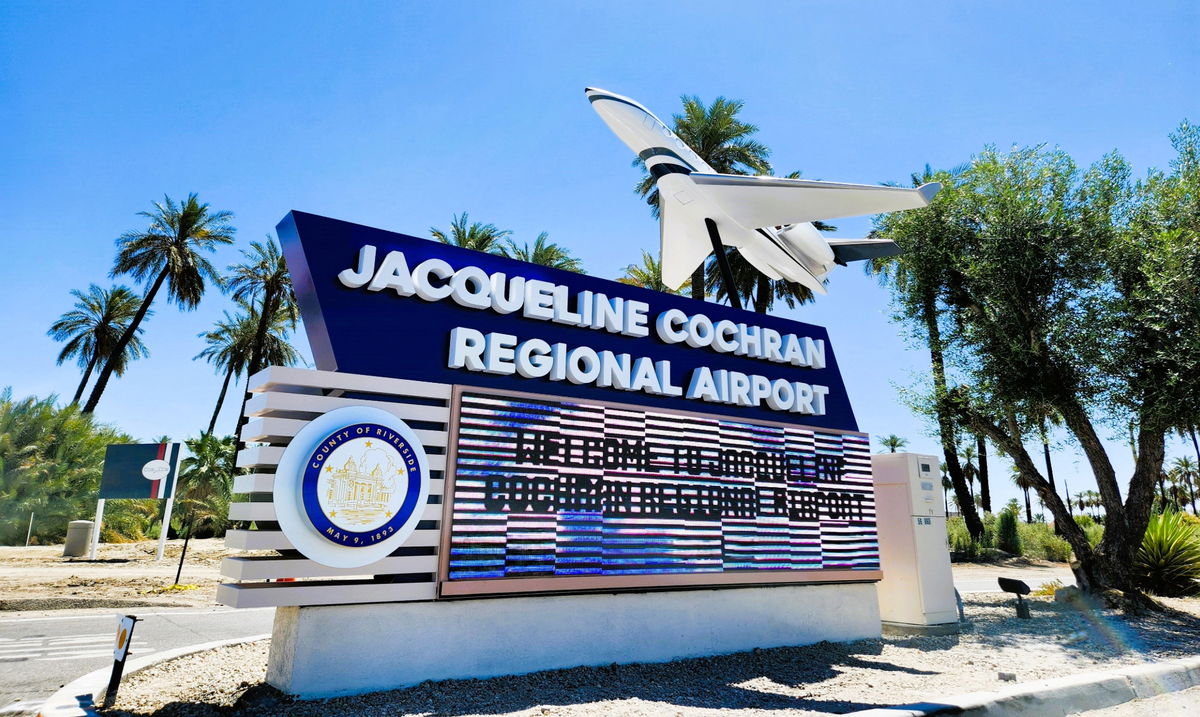Board enacts prohibition to off-site access to Thermal, other airports

City News Service
RIVERSIDE, Calif. (KESQ) – Despite conflicting details about potential advantages and disadvantages, the Board of Supervisors today enacted a policy prohibiting future expanded use of Jacqueline Cochran Regional Airport in Thermal by a Native American tribe and other entities seeking so-called “through-the-fence” agreements.
“The FAA is not very clear on this subject,” board Chairman Manuel Perez said ahead of the 4-0 vote, with Supervisor Jose Medina abstaining. “This is not exactly black and white. But it’s up to the county. understand the larger picture. We have to support the staff recommendation.”
The Transportation & Land Management Agency sought a blanket prohibition on through-the-fence concessions, and the board’s vote affirmed the new policy for Thermal — as well as the other four county owned airports.
The action came following roughly two hours of TLMA presentations, comments by interested parties and the board members’ own observations during a hearing at the County Administrative Center Tuesday.
Through-the-fence compacts enable private parties to establish easements or direct pathways for airplanes and vehicles from land immediately adjacent to aerodromes onto their tarmacs and runways.
The Twentynine Palms Band of Mission Indians acquired 600 acres fronting Thermal airport for the express purpose of developing the land as an off-site adjunct to the airport property, creating hangars and other facilities, with full access to the runway environment via through-the-fence, or TTF, concessions.
Tribal officials said there had been informal negotiations on the subject until April, when the county abruptly fell silent.
County Airports Director Angela Jamison told the board the county stood to lose millions in potential future grants from the Federal Aviation Administration if TTF agreements were established, submitting a five-page letter to the board from the agency which contained guidelines on TTFs, but no clear declarations about how to determine their viability.
A tribal spokesman told the board development of land around the airport, with a TTF, was focused on “what’s best for the region,” not solely the tribe.
“High quality jobs, workforce training and economic growth, which benefits every supervisorial district,” he said.
Former FAA Chief Counsel Marc Nichols, now in private practice, was hired by the tribe to review all aspects of a prospective TTF and asserted there was no regulatory bar.
“There are over 300 FAA-approved TTFs in effect nationwide today,” Nichols said. “Thirteen of those are in California.”
He said most of them were established between municipalities and commercial aircraft operators, including FedEx and UPS. One of the tribe’s goals had been to create space for air cargo intake and processing facilities.
The nonprofit Burger Foundation donated 20 acres for the county’s current sheriff’s aviation hub at Thermal airport, and foundation Vice President Mike Rover said access for the law enforcement operation came with a TTF.
“Thermal airport is now like a rich person’s club for people to fly in (to the Coachella Valley) on their private jets,” Rover said. “Through-the- fence access would democratize this airport. The balancing of interests should be the goal.”
Standing in opposition to the TTFs were the current fixed base operators, or FBOs, that provide fuel, tide-down space and hangar usage — Atlantic Aviation and Desert Jet.
“A TTF competes with businesses already invested in the airport,” Atlantic Aviation spokesman Eric Newman said. “It would weaken the airport’s revenue base. Aviation infrastructure developed by our business ultimately reverts to public (county) ownership.”
Desert Jet owner Jim McCool said his company is working on a $20 million investment at the airport, reflecting an on-site “substantial economic interest.”
“Nobody will invest in airports that permit unfair competition using through-the-fence,” he said.
La Quinta City Councilman Steve Sanchez advocated “protecting our FBOs and federal funding” by denying TTFs.
The city’s mayor, Linda Evans, took the opposite view, telling the board “all stakeholders” should be engaged before enactment of a county policy.
When controversy arises, pause and have further discussion,” she said. “Consider all compromises and look at what enhances economic growth and opportunity.”
The matter proved befuddling to Supervisor Karen Spiegel, who agreed “further conversation would be warranted,” though in the end she decided to vote with the majority.
The board’s resolution establishing a bar to TTFs could be reconsidered at any time.